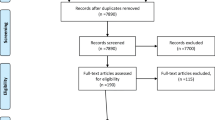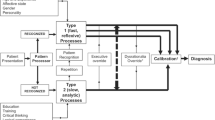Abstract
Recent national guidelines recommend genetic risk assessment for all patients diagnosed with pancreatic cancer, yet individuals with pancreatic cancer obtain genetic testing at suboptimal rates. Both patient and provider factors play a role in adherence to genetic testing recommendations. The purpose of this study was to understand health care provider perspectives of caring for patients with inherited pancreatic cancer risk. The study was a cross-sectional mixed method study utilizing a qualitative interview and a survey. The study sample included health care providers who provide care for patients with pancreatic cancer or inherited risk. Qualitative data were analyzed using content analysis, while quantitative data were summarized using descriptive statistics. Thirty participants had complete interview data and 29 completed a survey. The sample was comprised of physicians (n = 17), genetic counselors (n = 6), nurses (n = 3), and social workers (n = 3). Respondents were less confident in their ability to identify patients with inherited pancreatic cancer risk compared with other hereditary cancer syndromes. Several challenges were identified including the pancreatic cancer illness trajectory; lack of evidence-based practice guidelines; difficulty interpreting genetic test results; and difficulty following up on referrals. Participants perceived a lack of educational resources for patients with inherited pancreatic cancer risk. Health care providers who care for individuals with inherited pancreatic cancer risk face challenges that are distinct from those encountered during the care of individuals for other hereditary cancers. There is a need for additional resources at the patient-, provider-, and system-level.
Similar content being viewed by others
Change history
17 December 2019
The original version of this article unfortunately contained a mistake. The name of “Matthew Yurgelun” is now corrected in the author group of this article.
17 December 2019
The original version of this article unfortunately contained a mistake. The name of ���Matthew Yurgelun��� is now corrected in the author group of this article.
References
LaDuca H, Stuenkel AJ, Dolinsky JS, Keiles S, Tandy S, Pesaran T, Chen E, Gau CL, Palmaer E, Shoaepour K, Shah D, Speare V, Gandomi S, Chao E (2014) Utilization of multigene panels in hereditary cancer predisposition testing: analysis of more than 2,000 patients. Genet Med 16(11):830–837. https://doi.org/10.1038/gim.2014.40
Syngal S, Brand RE, Church JM, Giardiello FM, Hampel HL, Burt RW, American College of G (2015) ACG clinical guideline: genetic testing and management of hereditary gastrointestinal cancer syndromes. Am J Gastroenterol 110(2):223–262; quiz 263. https://doi.org/10.1038/ajg.2014.435
Welinsky S, Lucas AL (2017) Familial pancreatic cancer and the future of directed screening. Gut Liver 11(6):761–770. https://doi.org/10.5009/gnl16414
Stoffel EM (2016) Heritable gastrointestinal cancer syndromes. Gastroenterol Clin N Am 45(3):509–527. https://doi.org/10.1016/j.gtc.2016.04.008
Stoffel EM (2015) Screening in GI cancers: the role of genetics. J Clin Oncol 33(16):1721–1728. https://doi.org/10.1200/JCO.2014.60.6764
Stoffel EM, McKernin SE, Brand R, Canto M, Goggins M, Moravek C, Nagarajan A, Petersen GM, Simeone DM, Yurgelun M, Khorana AA (2018) Evaluating susceptibility to pancreatic cancer: ASCO provisional clinical opinion. J Clin Oncol JCO1801489. https://doi.org/10.1200/JCO.18.01489
Lowery MA, Wong W, Jordan EJ, Lee JW, Kemel Y, Vijai J, Mandelker D, Zehir A, Capanu M, Salo-Mullen E (2018) Prospective evaluation of germline alterations in patients with exocrine pancreatic neoplasms. J Natl Cancer Inst 110(10):1067–1074
Shindo K, Yu J, Suenaga M, Fesharakizadeh S, Cho C, Macgregor-Das A, Siddiqui A, Witmer PD, Tamura K, Song TJ, Navarro Almario JA, Brant A, Borges M, Ford M, Barkley T, He J, Weiss MJ, Wolfgang CL, Roberts NJ, Hruban RH, Klein AP, Goggins M (2017) Deleterious germline mutations in patients with apparently sporadic pancreatic adenocarcinoma. J Clin Oncol 35(30):3382–3390. https://doi.org/10.1200/JCO.2017.72.3502
Klein AP, Brune KA, Petersen GM, Goggins M, Tersmette AC, Offerhaus GJA, Griffin C, Cameron JL, Yeo CJ, Kern S (2004) Prospective risk of pancreatic cancer in familial pancreatic cancer kindreds. Cancer Res 64(7):2634–2638
Underhill M, Berry D, Dalton E, Schienda J, Syngal S (2015) Patient experiences living with pancreatic cancer risk. Hered Cancer Clin Pract 13(1):13–19. https://doi.org/10.1186/s13053-015-0034-1
Torphy RJ, Schulick RD (2018) Screening of patients at risk for familial pancreatic cancer: what is beneficial? Surg Clin North Am 98(1):25–35. https://doi.org/10.1016/j.suc.2017.09.003
Canto MI, Almario JA, Schulick RD, Yeo CJ, Klein A, Blackford A, Shin EJ, Sanyal A, Yenokyan G, Lennon AM, Kamel IR, Fishman EK, Wolfgang C, Weiss M, Hruban RH, Goggins M (2018) Risk of neoplastic progression in individuals at high risk for pancreatic cancer undergoing long-term surveillance. Gastroenterology 155(3):740–751.e742. https://doi.org/10.1053/j.gastro.2018.05.035
National Comprehensive Cancer Network. Pancreatic Cancer Adenocarcinoma (Version 3.2019) https://www.nccn.org/professionals/physician_gls/PDF/pancreatic.pdf. Accessed 01 Nov 2019
Hu C, Hart SN, Polley EC, Gnanaolivu R, Shimelis H, Lee KY, Lilyquist J, Na J, Moore R, Antwi SO, Bamlet WR, Chaffee KG, DiCarlo J, Wu Z, Samara R, Kasi PM, McWilliams RR, Petersen GM, Couch FJ (2018) Association between inherited germline mutations in cancer predisposition genes and risk of pancreatic cancer. JAMA 319(23):2401–2409. https://doi.org/10.1001/jama.2018.6228
Underhill M, Hong F, Lawrence J, Blonquist T, Syngal S (2018) Relationship between individual and family characteristics and psychosocial factors in persons with familial pancreatic cancer. Psychooncology 27(7):1711–1718. https://doi.org/10.1002/pon.4712
Epstein R, Street R Jr (2013) Patient-centered communication in cancer care: promoting healing and reducing suffering. Monograph from the National Cancer Institute, Bethesda
Patton MQ (2002) Qualitative evaluation and research methods, 3rd edn. Sage Publications, Inc
Hsieh HF, Shannon SE (2005) Three approaches to qualitative content analysis. Qual Health Res 15(9):1277
Dudley B, Karloski E, Monzon FA, Singhi AD, Lincoln SE, Bahary N, Brand RE (2018) Germline mutation prevalence in individuals with pancreatic cancer and a history of previous malignancy. Cancer 124(8):1691–1700
Febbraro T, Robison K, Wilbur JS, Laprise J, Bregar A, Lopes V, Legare R, Stuckey A (2015) Adherence patterns to National Comprehensive Cancer Network (NCCN) guidelines for referral to cancer genetic professionals. Gynecol Oncol 138(1):109–114. https://doi.org/10.1016/j.ygyno.2015.04.029
Stuckey A, Febbraro T, Laprise J, Wilbur JS, Lopes V, Robison K (2016) Adherence patterns to National Comprehensive Cancer Network Guidelines for referral of women with breast cancer to genetics professionals. Am J Clin Oncol 39(4):363–367. https://doi.org/10.1097/coc.0000000000000073
Childers CP, Childers KK, Maggard-Gibbons M, Macinko J (2017) National estimates of genetic testing in women with a history of breast or ovarian cancer. J Clin Oncol 35(34):3800–3806. https://doi.org/10.1200/JCO.2017.73.6314
National Comprehensive Cancer Network. Pancreatic Cancer Adenocarcinoma (Version 3.2019) https://www.nccn.org/professionals/physician_gls/pdf/genetics_screening.pdf. Accessed 01 Nov 2019
Kurian AW, Li Y, Hamilton AS, Ward KC, Hawley ST, Morrow M, McLeod MC, Jagsi R, Katz SJ (2017) Gaps in incorporating germline genetic testing into treatment decision-making for early-stage breast cancer. J Clin Oncol 35(20):2232–2239. https://doi.org/10.1200/JCO.2016.71.6480
Singh H, Schiesser R, Anand G, Richardson PA, El-Serag HB (2010) Underdiagnosis of Lynch syndrome involves more than family history criteria. Clin Gastroenterol Hepatol 8(6):523–529. https://doi.org/10.1016/j.cgh.2010.03.010
Johnson LM, Valdez JM, Quinn EA, Sykes AD, McGee RB, Nuccio R, Hines-Dowell SJ, Baker JN, Kesserwan C, Nichols KE, Mandrell BN (2017) Integrating next-generation sequencing into pediatric oncology practice: an assessment of physician confidence and understanding of clinical genomics. Cancer 123(12):2352–2359. https://doi.org/10.1002/cncr.30581
Douma KF, Smets EM, Allain DC (2016) Non-genetic health professionals’ attitude towards, knowledge of and skills in discussing and ordering genetic testing for hereditary cancer. Familial Cancer 15(2):341–350. https://doi.org/10.1007/s10689-015-9852-6
Prochniak CF, Martin LJ, Miller EM, Knapke SC (2012) Barriers to and motivations for physician referral of patients to cancer genetics clinics. J Genet Couns 21(2):305–325. https://doi.org/10.1007/s10897-011-9401-x
Yurgelun MB, Chittenden AB, Ukaegbu CI, Dhingra TG, Gaonkar S, Sotelo J, Rubinson DA, McCleary NJ, Clancy TE, Abrams TA, Cleary JM, Madigan AP, Brais LK, Perez K, Wolpin BM, Syngal S (2018) Implementing universal genetic counseling (GC) and multigene germline testing (MGT) for pancreatic cancer (PC) patients (pts). J Clin Oncol 36(15_suppl):1512. https://doi.org/10.1200/JCO.2018.36.15_suppl.1512
Kinney AY, Steffen LE, Brumbach BH, Kohlmann W, Du R, Lee J-H, Gammon A, Butler K, Buys SS, Stroup AM, Campo RA, Flores KG, Mandelblatt JS, Schwartz MD (2016) Randomized noninferiority trial of telephone delivery of BRCA1/2 genetic counseling compared with in-person counseling: 1-year follow-up. J Clin Oncol 34(24):2914–2924. https://doi.org/10.1200/JCO.2015.65.9557
McCuaig J, Armel S, Care M, Volenik A, Kim R, Metcalfe K (2018) Next-generation service delivery: a scoping review of patient outcomes associated with alternative models of genetic counseling and genetic testing for hereditary cancer. Cancers 10(11):435
Bednar EM, Oakley HD, Sun CC, Burke CC, Munsell MF, Westin SN, Lu KH (2017) A universal genetic testing initiative for patients with high-grade, non-mucinous epithelial ovarian cancer and the implications for cancer treatment. Gynecol Oncol 146(2):399–404. https://doi.org/10.1016/j.ygyno.2017.05.037
Quinn VF, Meiser B, Kirk J, Tucker KM, Watts KJ, Rahman B, Peate M, Saunders C, Geelhoed E, Gleeson M, Barlow-Stewart K, Field M, Harris M, Antill YC, Cicciarelli L, Crowe K, Bowen MT, Mitchell G (2016) Streamlined genetic education is effective in preparing women newly diagnosed with breast cancer for decision making about treatment-focused genetic testing: a randomized controlled noninferiority trial. Genet Med 19:448. https://doi.org/10.1038/gim.2016.130 https://www.nature.com/articles/gim2016130#supplementary-information
McCuaig JM, Tone AA, Maganti M, Romagnuolo T, Ricker N, Shuldiner J, Rodin G, Stockley T, Kim RH, Bernardini MQ (2019) Modified panel-based genetic counseling for ovarian cancer susceptibility: A randomized non-inferiority study. Gynecol Oncol. https://doi.org/10.1016/j.ygyno.2018.12.027
Bradbury AR, Patrick-Miller L, Long J, Powers J, Stopfer J, Forman A, Rybak C, Mattie K, Brandt A, Chambers R, Chung WK, Churpek J, Daly MB, Digiovanni L, Farengo-Clark D, Fetzer D, Ganschow P, Grana G, Gulden C, Hall M, Kohler L, Maxwell K, Merrill S, Montgomery S, Mueller R, Nielsen S, Olopade O, Rainey K, Seelaus C, Nathanson KL, Domchek SM (2014) Development of a tiered and binned genetic counseling model for informed consent in the era of multiplex testing for cancer susceptibility. Genet Med 17:485. https://doi.org/10.1038/gim.2014.134 https://www.nature.com/articles/gim2014134#supplementary-information
Petzel SV, Vogel RI, McNiel J, Leininger A, Argenta PA, Geller MA (2014) Improving referral for genetic risk assessment in ovarian cancer using an electronic medical record system. Int J Gynecol Cancer 24(6):1003–1009. https://doi.org/10.1097/igc.0000000000000148
Uyar D, Neary J, Monroe A, Nugent M, Simpson P, Geurts JL (2018) Implementation of a quality improvement project for universal genetic testing in women with ovarian cancer. Gynecol Oncol 149(3):565–569. https://doi.org/10.1016/j.ygyno.2018.03.059
Acknowledgements
This work was conducted with the support of a KL2 award (PI: Underhill-Blazey) (an appointed KL2 award) from Harvard Catalyst | The Harvard Clinical and Translational Science Center (National Center for Advancing Translational Sciences, National Institutes of Health Award KL2 TR002542). The content is solely the responsibility of the authors and does not necessarily represent the official views of Harvard Catalyst, Harvard University and its affiliated academic healthcare centers, or the National Institutes of Health.
Author information
Authors and Affiliations
Corresponding author
Additional information
Publisher’s Note
Springer Nature remains neutral with regard to jurisdictional claims in published maps and institutional affiliations.
Rights and permissions
About this article
Cite this article
Underhill, M.L., Pozzar, R., Chung, D. et al. Health Care Provider Perceptions of Caring for Individuals with Inherited Pancreatic Cancer Risk. J Canc Educ 35, 194–203 (2020). https://doi.org/10.1007/s13187-019-01623-1
Published:
Issue Date:
DOI: https://doi.org/10.1007/s13187-019-01623-1




